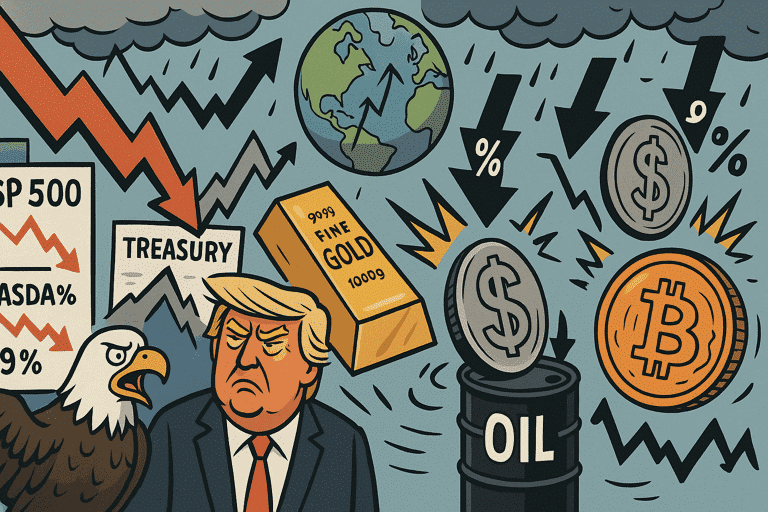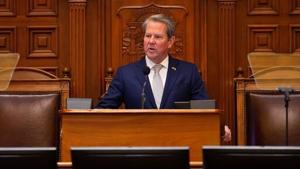News from the South - Florida News Feed
Trump touts manufacturing while undercutting state efforts to help factories

by Tim Henderson, Florida Phoenix
April 22, 2025
Steve Whalen loves his home state of Delaware and he’s proud to manufacture computers there that police officers use to “catch bad guys.” He said tariffs on imports from China and other countries, along with sharp cuts to government spending and the winding down of a program for small manufacturers, will make it harder for him to do that.
“We got into business to keep costs low for the ‘good guys,’ but tariffs or anything else that raises prices keeps us from doing that,” said Whalen, co-founder of Sumuri LLC in Magnolia, Delaware, which makes computer workstations for police and government investigations. Whalen has to buy materials overseas, often from China, and he said the tariffs could force him to triple his price on some workstations to $12,000.
Tariffs are the main tool President Donald Trump is wielding to try to boost manufacturing in the United States, calling the achievement of that goal “an economic and national security priority.” But the higher levies have led to retaliation and suspended shipments, and Whalen said they are just one of several Trump administration actions squeezing his small manufacturing business.
The wave of federal spending cuts, which has affected grants to state and local governments, could make his customers put off purchases. And the administration has moved to cut off funding for a $175 million state-based program that provides expert advice to smaller factories like his.
The Delaware version of that program, the Manufacturing Extension Partnership, helped Sumuri fit expanded product lines into the limited space in its small-town factory.
“We were really having a tough time trying to figure out how to utilize our space efficiently,” Whalen said. “They came here and helped us organize and optimize, and it made a huge difference.”
On April 1, the Trump administration cut off funding for 10 such manufacturing programs that were up for renewal in Delaware, Hawaii, Iowa, Kansas, Maine, Mississippi, Nevada, New Mexico, North Dakota, and Wyoming. Other state MEP programs will expire over the next year.
The administration gave a reprieve to those 10 states until the end of the fiscal year after objections from Democrats in the U.S. House and Senate. The National Institute of Standards and Technology, which manages the program, extended funding for the 10 states “after further review and consideration” and will “continue to evaluate plans for the program,” said agency spokesperson Chad Boutin.
The program has come under fire from Republicans since the George W. Bush administration first tried to end it in 2009, and again during the first Trump administration, but Congress has continued to fund it. The conservative Heritage Foundation said in a 2023 book that MEP’s functions “would be more properly carried out by the private sector.”
‘Dots don’t quite connect’
Buckley Brinkman, executive director of the Wisconsin Center for Manufacturing and Productivity, which works with his state’s MEP program, said it didn’t make much sense for the administration to shutter the program as it seeks to boost the number of U.S. manufacturing jobs.
“It’s one of those things where the dots don’t quite connect,” Brinkman said. “I mean, jeez, here’s a part of government that doesn’t cost a whole lot, in the grand scheme of things — less than $200 million a year — that’s returning 10-to-1 to the national treasury, working on a priority for the president.”
A 2024 Upjohn report found an even higher return: 17-to-1 on $175 million in the 2023 fiscal year, creating $3 billion in new federal tax revenue.
In Wisconsin, which has lost more than 138,000 manufacturing jobs since 2000, some parts makers report that business is booming as manufacturers seek to avoid tariffs by finding U.S. alternatives to Chinese manufacturers, Brinkman said. But more broadly, he doubts that the tariffs will spark a manufacturing boom in the state.
“Do we want all this manufacturing back? Do we have the will to get it back? The answer to both those questions is ‘no,’” Brinkman said. “Even without the tariffs we don’t really want Americans doing a lot of those jobs that are in Chinese factories right now.”
I mean, jeez, here’s a part of government that doesn’t cost a whole lot, in the grand scheme of things … that’s returning 10-to-1 to the national treasury.
– Buckley Brinkman, director of Wisconsin Center for Manufacturing and Productivity
In Delaware, the MEP helped Sumuri manage its expansion, but unpredictable tariffs and budgets are now a bigger danger, said Jason Roslewicz, Sumuri’s vice president for business development. He’s had to devote two employees to monitoring supply lines, tariff news, and competitor pricing to stay afloat.
“We went from putting things together in a basement to a 19,000-square-foot facility, doing exactly what we’re supposed to do here in the U.S., and it’s all in danger of coming apart because of this problem,” Roslewicz said.
Other small manufacturers express similar concerns. TJ Semanchin, who owns Wonderstate Coffee in Madison, Wisconsin, said his business roasting and distributing coffee is in crisis because of the tariffs.
Wonderstate’s costs have almost doubled between tariffs on imported coffee and packaging materials from China, plus a cyclical rise in coffee prices. “I’m borrowing money to pay for this and at some point we’ll have to raise prices. We’ll have no choice,” Semanchin said.
But many Republican state officials, and even some Democrats, have backed Trump’s tariff push, including Virginia Republican Gov. Glenn Youngkin, who credited the Trump administration with “reshoring manufacturing and restoring this middle class which has been eviscerated over the last 20 years.”
“There’s dislocation in the short term, there’s long-term opportunity,” Youngkin said in an April 15 interview on CNBC. He said his state is hearing more interest from manufacturers looking to build or expand local factories since Trump took office. For instance, Delta Star recently announced a plan to add 300 jobs building power transformers in Lynchburg.
“The president has been clear that there will be some level of tariffs, and folks are coming, and that’s good for Virginia,” Youngkin said in the CNBC interview.
Virginia’s MEP program, called Genedge, claims successes in streamlining production and quality control for local factory products including TreeDiaper, an automated tree watering device made in Ashland, and for advising EDM, a Lynchburg plastic product assembler that needed more efficient production to keep overseas competition at bay. But Virginia’s MEP is one of the state programs slated to expire in the next year.
Long-term trend
The slide in U.S. manufacturing jobs has continued on and off since 1979, and many experts say tariffs will not bring them back. Despite a modest bounce back under the Biden administration, the number of manufacturing jobs has declined from nearly 20 million in 1979 to less than 13 million today, even as the total U.S. workforce has grown from 89 million to 159 million during that period.
Manufacturing faces labor shortages, with many factories operating below capacity because they can’t find enough workers, according to Jason Miller, a professor of supply chain management at Michigan State University.
That doesn’t bode well for a mass reshoring of factories from China and other countries, but Miller doesn’t expect that to happen anyway.
“Firms are not planning on reshoring much of the work that was offshored 20 to 25 years ago,” Miller said. “I’m not concerned about having enough workers for manufacturing jobs that would be reshored because this isn’t going to happen.”
In a 2024 survey by the libertarian Cato Institute, 80% of Americans said America would be better off if more people worked in manufacturing, but only 25% said they personally would be better off working in a factory. The Chinese government has poked fun at the idea with memes of American workers struggling to make Nike sneakers with sewing machines.
Joseph McCartin, a labor historian at Georgetown University, said the idea of a manufacturing rebirth is a “mirage being conjured to attract the support of workers who have been underpaid in an increasingly unequal economy for the last 40 years, and are desperate for some hope of renewed upward mobility.”
Manufacturing “isn’t the magic wand to make that happen,” McCartin said.
“What we need is to raise workers’ wages and make the economy less prone to producing inequality,” McCartin said. “That mission is not at all what Trump is about. He is dealing in stale nostalgia.”
This story first appeared in Stateline, part of States Newsroom, a nonprofit news network supported by grants and a coalition of donors as a 501c(3) public charity. Stateline maintains editorial independence. Contact Editor Scott S. Greenberger for questions: info@stateline.org. Stateline reporter Tim Henderson can be reached at thenderson@stateline.org.
Florida Phoenix is part of States Newsroom, a nonprofit news network supported by grants and a coalition of donors as a 501c(3) public charity. Florida Phoenix maintains editorial independence. Contact Editor Michael Moline for questions: info@floridaphoenix.com.
The post Trump touts manufacturing while undercutting state efforts to help factories appeared first on floridaphoenix.com
Note: The following A.I. based commentary is not part of the original article, reproduced above, but is offered in the hopes that it will promote greater media literacy and critical thinking, by making any potential bias more visible to the reader –Staff Editor.
Political Bias Assessment: Center-Left
The content reflects a Center-Left bias, primarily through its critical stance on the Trump administration’s tariff policies and its support for government programs that aid small manufacturers. The narrative emphasizes the negative impact of tariffs and spending cuts on American manufacturing, showcasing voices that argue for the necessity of supportive government programs like the Manufacturing Extension Partnership (MEP). The text also incorporates perspectives that highlight economic inequality and the need for higher wages, which align with progressive economic viewpoints. While it does present some Republican views in favor of tariffs, the overall focus is on the adverse effects of these policies on manufacturers and workers, suggesting a tilt towards advocating government intervention and support.
News from the South - Florida News Feed
Federal report due on Lumbee Tribe of North Carolina’s path to recognition as a tribal nation

SUMMARY: Members of the Lumbee Tribe in North Carolina are eagerly anticipating a Department of the Interior report that could pave the way for federal recognition as a tribal nation. In January, President Trump directed the Department to devise a plan for the Lumbee’s recognition, due within 90 days. Despite being state-recognized for decades, the Lumbee have struggled to gain federal acknowledgment, which would provide access to critical resources and land rights. Both Trump and Kamala Harris promised support during the 2024 election campaign. However, some federally-recognized tribes oppose their claims, complicating the Lumbee’s path to recognition.
The post Federal report due on Lumbee Tribe of North Carolina’s path to recognition as a tribal nation appeared first on www.news4jax.com
News from the South - Florida News Feed
Florida Senate higher education bill faces questions as it heads to full vote

SUMMARY: A new bill, Senate Bill 1726, aims to reform leadership selection in Florida’s higher education system by requiring presidential search committees to present three candidates for final consideration. Sponsored by Sen. Alexis Calatayud, the legislation seeks to enhance accountability and transparency in governance. It responds to backlash stemming from a previous appointment of a sole finalist, Ben Sasse, at the University of Florida. Concerns from Sen. Blaise Ingoglia about potential shifts in decision-making authority from the Board of Governors to university trustees were raised, yet Calatayud affirmed the bill’s constitutional legitimacy. The bill has passed its final committee vote and proceeds to the Senate.
The post Florida Senate higher education bill faces questions as it heads to full vote appeared first on www.news4jax.com
News from the South - Florida News Feed
How stocks, bonds and other markets have fared so in 2025

SUMMARY: Global financial markets are experiencing significant turmoil in 2025 due to President Trump’s escalating trade war. The S&P 500 has fallen 13%, with the Nasdaq dropping 19%, while overseas markets outperform. Treasury yields are rising amid concerns over inflation and a potential recession, while gold prices reach record highs. The U.S. dollar has dropped 9%, reflecting anxiety over tariffs and economic uncertainty. Oil prices are down due to fears of an economic slowdown, while Bitcoin remains volatile, fluctuating between $75,000 and $109,000. Experts warn that Trump’s tariffs could lead to a recession, impacting global trade and energy markets.
The post How stocks, bonds and other markets have fared so in 2025 appeared first on www.news4jax.com
-

 News from the South - Missouri News Feed5 days ago
News from the South - Missouri News Feed5 days agoDrivers brace for upcoming I-70 construction, slowdowns
-

 News from the South - North Carolina News Feed7 days ago
News from the South - North Carolina News Feed7 days agoFDA warns about fake Ozempic, how to spot it
-

 News from the South - Missouri News Feed7 days ago
News from the South - Missouri News Feed7 days agoAbandoned property causing issues in Pine Lawn, neighbor demands action
-

 News from the South - Florida News Feed2 days ago
News from the South - Florida News Feed2 days agoJim talks with Rep. Robert Andrade about his investigation into the Hope Florida Foundation
-

 Mississippi Today5 days ago
Mississippi Today5 days agoSee how much your Mississippi school district stands to lose in Trump’s federal funding freeze
-

 News from the South - Arkansas News Feed4 days ago
News from the South - Arkansas News Feed4 days agoArkansan appears on Wheel of Fortune
-

 News from the South - Georgia News Feed7 days ago
News from the South - Georgia News Feed7 days agoTax rebate coming soon to some Georgians | Georgia
-

 News from the South - Virginia News Feed6 days ago
News from the South - Virginia News Feed6 days agoLieutenant governor race heats up with early fundraising surge | Virginia











































